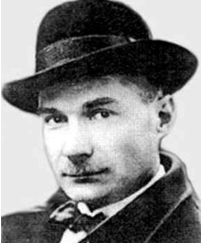On this date in 1884 (Jan. 20, Julian calendar), Russian author and dissident Yevgeny Ivanovich Zamyatin was born in Lebedyan, about 200 miles south of Moscow, to Maria (née Platonova) and Ivan Dmitrievich Zamyatin. His father was a Russian Orthodox priest, allowed to marry, and a schoolmaster.
In a 1922 essay, Zamyatin recalled his childhood and reading by the age of 4: “You will see a very lonely child, without companions of his own age, on his stomach, over a book, or under the piano, on which his mother is playing Chopin. … My childhood was spent almost without friends. My friends were books.” (A Soviet Heretic: Essays by Yevgeny Zamyatin, ed. Mirra Ginsburg, 1970)
In 1902 he enrolled at the St. Petersburg Polytechnic Institute to study naval engineering, then lost his Christian faith and joined the Bolsheviks to take part in the failed revolution against the tsar in 1905. Exiled to the hinterlands, he later returned secretly to St. Petersburg, only to be arrested and deported again in 1911. Amnesty followed in 1913. Along with his political activities, Zamyatin began to write. The journal that published his novella “At the End of the World” was impounded and he was tried and acquitted of maligning the military.
He finished his studies and worked for the Imperial Navy, moving to England in 1916 to supervise construction by British firms of Russian icebreakers. After the communist revolution of 1917 he returned to Russia, working with Maxim Gorky and others on translations of such writers as O. Henry, H.G. Wells and Jack London. He published “The Fires of St. Dominic” about the Spanish Inquisition.
Biographer Alex M. Shane wrote that Zamyatin displayed “a far-ranging grasp of Wells’ entire literary output and of the utopian literary tradition in general. … Zamyatin also expressed his faith in brotherly love, in a humanism that would establish universal peace among men (hence the warmth of his appreciation of Wellsian humanism).” (Introduction to “A Soviet Heretic”)
Wells’ work inspired him to write the novel “We” in 1920-21. Regarded by some as the first anti-utopian novel, it satirized life in a future collectivist state. It “deeply influenced” novels about the future such as “Brave New World” by Aldous Huxley, “Nineteen Eighty-Four” by George Orwell and “Fahrenheit 451” by Ray Bradbury. Not until 1988 was it allowed to be published in the Soviet Union.
Orwell, reviewing “We” for Tribune magazine in 1946, three years before he published “Nineteen Eighty-Four,” wrote: “It is in effect a study of the Machine, the genie that man has thoughtlessly let out of its bottle and cannot put back again. This is a book to look out for when an English version appears.”
“The best single work of science fiction yet written,” judged Ursula K. Le Guin in a blurb for an Uproar Books Classics reprint of “We” in 2020.
After a Russian émigré journal published “We” in 1927, Zamyatin’s work was banned and life in his homeland became untenable. Josef Stalin gave him permission in 1931, perhaps convinced by Gorky’s entreaties, to let Zamyatin emigrate.
Biographer Ginsburg wrote that his “last years in Paris were years of great material hardship and loneliness. As Remizov wrote, ‘He came with sealed lips and a sealed heart.’ He found little in common with most of the emigrés who had left Russia a decade earlier.”
After his death of a heart attack at age 53 in 1937, his wife, Lyudmila Usova, who had worked as a midwife and his secretary, became his literary executor. She lived until 1965 and was buried alongside him in Paris.
“The world is kept alive only by heretics: the heretic Christ, the heretic Copernicus, the heretic Tolstoy,” Zamyatin wrote in “Tomorrow” (1919). “Our symbol of faith is heresy.” (D. 1937)


